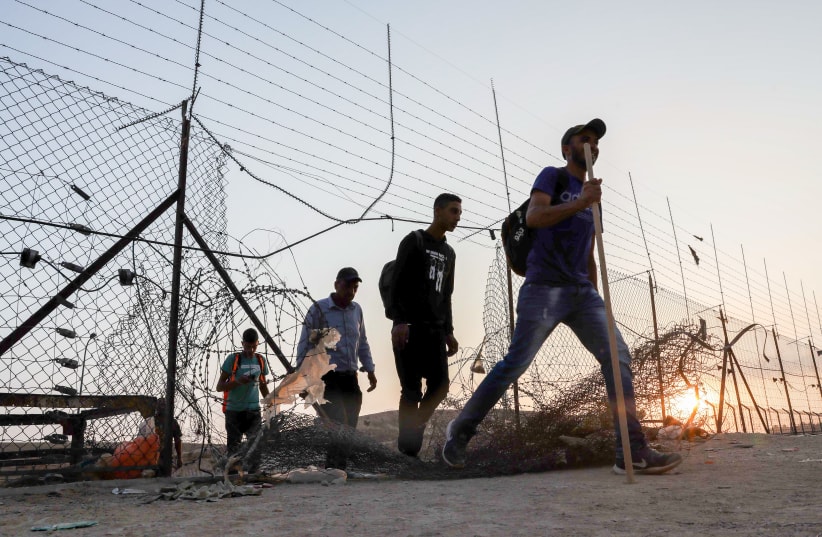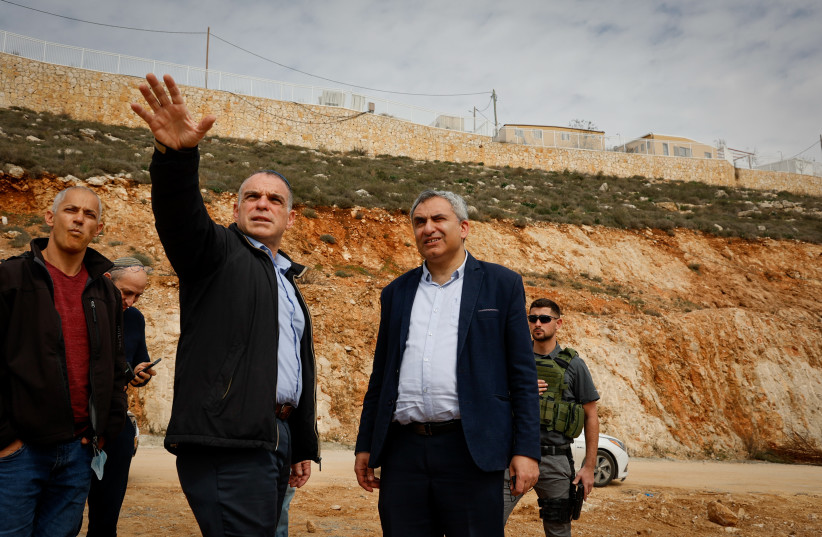Right-wing politicians accused Prime Minister Naftali Bennett of supporting a Palestinian state, after the security cabinet decided to rebuild 40 kilometers of the West Bank security barrier in the northern Samaria area.
“This is not a security fence, this is a border wall,” MK Orit Struck (Religious Zionist Party) said on Monday.
The cabinet’s decision on Sunday night came after Palestinian gunmen crossed into sovereign Israel through gaps in the defunct barrier and executed two terrorist attacks in Bnei Brak and Tel Aviv that claimed eight lives.
The approval was NIS 360 million to begin replacing 40 kilometers of wire fencing with nine-meter high concrete walls.
Struck and the RZP are among those on the Right and the Left in Israel who believe that the barrier has little to do with security and everything to do with marking the permanent future border of the State of Israel.
The Right was already concerned that Bennett had moved Left in support of a Palestinian state when he used the phrase “West Bank” rather than “Judea and Samaria” for the first time in his political career, at a joint news conference in Jerusalem last month with Secretary of State Antony Blinken. Along with the Likud, the RZP is in the midst of a pressure campaign to sway right-wing members of the coalition to resign.
Struck charged that Bennett “will be remembered for generations as one who – in the middle of a wave of terror, without a majority in the Knesset, with zero public legitimacy, and at a time when he leaned on terrorist supporters – used the Prime Minister’s Office to fulfill leftist plans and build a border wall in the heart of Israel. You have no mandate, Naftali, to divide the land. This foolish decision will be overturned the moment after the dangerous government you formed will finally fall – and that moment is very close.”
Labor Party Secretary-General Eran Hermoni accused the RZP of sacrificing the lives of Israeli to advance its political agenda.
“The cat is out of the bag,” said Hermoni. “The RZP’s opposition to the security wall proved that it prefers to abandon Israel’s security with Israel for the golden calf of politically isolated settlements. The cabinet’s decision to rebuild the security wall is an important step in the war on terrorism, and one that millions of Israelis are begging for.”
Hermoni said that “only separation from the Palestinians will ensure a Jewish, democratic and secure Israel.”
The RZP insisted that the issue was political, and issued a statement warning that the decision to rebuild the barrier was a revival of the Oslo Accords, which had originally set the stage for a two-state resolution to the conflict.
“Oslo is here,” the party statement reads. “When we warned that Bennett had crossed the Rubicon to the defeatist Left with its [support for a] Palestinian state, there were those who raised an eyebrow. Today, he is following in the footsteps of [former prime ministers Yitzhak] Rabin, [Shimon] Peres and [Ariel] Sharon and is de facto dividing the country. Bennett had been among those who opposed the security barrier and had sworn not to give up an inch of territory from the Land of Israel. He is now, together with Defense Minister Benny Gantz, separating Judea and Samaria from ‘little Israel’ and establishing a Palestinian state.”
Efrat Council head Oded Revivi, among the settler leaders who have opposed construction of the barrier in the Gush Etzion region, said that while fences and barriers create a feeling of security, they do not create real security.
“The decision to build a wall around northern Samaria in place of the existing fence is a mistake,” Revivi said. “Instead of addressing the problem that is developing in northern Samaria, they are trying to hide it behind a wall. I learned that the presence of walls and fences is not acceptable – it creates anti-Israel sentiments throughout the world. People who visit Efrat and learn that there are no fences here are impressed.
“Northern Samaria has long been a violent hotbed of terrorism. Does anyone actually think that the construction of a wall will cause terrorism to disappear? Will the hatred simply fade?”
The 40 kilometers to be rebuilt will run from the Salem area to the Bat Hefer region, “composed of concrete, protective equipment and additional technological components,” the Defense Ministry said. “It will be up to nine meters high and will replace the fence that was built about 20 years ago.”
The project, led by Brig.-Gen. Eran Ofir, is slated to begin as soon as possible.
The bulk of the 525-kilometer barrier, designed to prevent terrorist attacks, has fallen into disrepair and has gaps throughout, through which thousands of Palestinians illegally cross into sovereign Israel to work.
The system of surveillance and maintenance that was designed to ensure that the barrier would be effective was never maintained, despite the NIS 8 billion already spent on the project.
Portions of the barrier are constructed from concrete, while the rest is composed of a wire fence, but it’s the surveillance system that makes it effective. The absence of such a system allows Palestinians to climb over the concrete sections of the barrier as well as cut through the wire sections.
The reconstruction project will improve security in northern Samaria, but gaps will remain in the bulk of the barrier. In addition, there are stretches that were never built in the Gush Etzion and South Hebron Hills regions of the West Bank.

